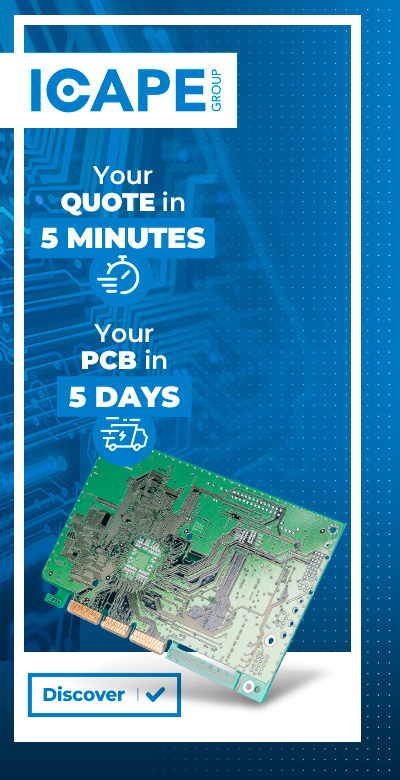
PCB |
Aspocomp Net Sales Up 19.3%
Net sales grew somewhat on the reference quarter mainly as a result of the excellent performance of the Suzhou, China plant and improvement in the net sales of the Sriracha, Thailand and Oulu, Finland plants.
Net sales of the Salo, Finland plant continued to decline, although at a slower rate, due to the plant's ongoing conversion project and a limited volume of newer products.
The Group's net sales per plant were as follows:
- the Finnish plants, 33 percent (41%)
- the Asian plants, 67 percent (59%)
The Group's net sales by market area were as follows:
- Europe, 58 percent (52%)
- Asia, 26 percent (39%)
- the Americas, 16 percent (9%)
The Group's net sales per product area were as follows:
- handheld devices and telecom networks, 61 percent (69%)
- automotive, industrial and consumer electronics, 39 percent (31%)
Profit in the July-September period was up on the previous quarter, as expected. Operating profit before depreciation was EUR 0.1 million (-0.2) and operating profit totaled EUR -4.3 million (-4.7).
Operating profit of the Chinese plant picked up markedly. Although improving on the April-June period, the heavy losses of the Salo plant still kept the Group's operating profit on a par with the reference quarter. In addition, the profit of the Thai plant fell sharply into the red during the last quarter, mainly attributable to unexpected technological problems. Material costs rose temporarily due to problems with outsourcing.
The Group's net financial expenses were EUR -0.5 million (0.0) and the profit for the period was EUR -4.5 million (-4.5). Earnings per share were EUR -0.27 (-0.27).
The full-year net sales and profit of the Aspocomp Group are forecast to improve somewhat compared with the previous year. The result for the last quarter is anticipated to improve on the third quarter; however, the full-year result will be clearly unprofitable due to the Salo plant's performance.
"The third quarter of the year was dissatisfying as the conversion project continued at the Salo, Finland plant and production suffered from a below average capacity utilization rate. In contrast, the yield of the new products, well below expectations during the first half of the year, was gradually improving during the July-September period", Aspocomp's CEO Maija-Liisa Friman commented.
Installation, start-up and testing of the two new plating lines at the Salo plant proceeded according to plan during the third quarter. When the new lines are in full use, the manufacturing process can be shortened and various process steps left out, which will cut manufacturing costs. The latest production runs for the new products have given promising results.
The result for the period was also somewhat affected by the Thai plant's sharp fall into the red during the third quarter of the year. This was mostly attributable to a temporary rise in material costs due to problems with outsourcing, which was conducted to meet customer delivery schedules. In addition, the plant faced unexpected technical problems that are currently being solved.
In contrast, the Chinese plant continued to excel, boasting steadily increasing profits as its HDI PCB capacity was fully booked. As a result, the operating profit of the Asian plants grew briskly on the reference period.
The HDI PCB market continued to grow throughout the January-September period. Market researchers forecast that in 2006, technologically complex HDI PCBs will account for about 13 percent of global PCB production, totaling around USD 43 billion (about EUR 34 billion) globally. Asian PCB production is forecast to grow by about 12 percent, whereas production in the rest of the world is expected to decline somewhat.
The project to build a new HDI PCB plant in Chennai, India proceeded according to plan. Piling works for the plant started on October 4, 2006.
After the review period, Aspocomp and GE Capital Solutions, Global Electronics Services executed a term sheet that provides EUR 10 million of equipment financing for the new Chennai facility."
According to market estimates, overall global PCB production in the July-September period grew by almost 5 percent on the previous quarter. In Asia, production grew by almost 6 percent and excluding Japan, almost 7 percent according to industry evaluations. Furthermore, demanding HDI PCB production increased even faster than total PCB production and in China, in particular, it was estimated to have grown by almost 9 percent since the end of previous quarter.
The Aspocomp Group's net sales for the January-September period were EUR 110.7 million (96.2), growing by 15.0 percent on the reference period in line with expectations.
Although the net sales posted by the Oulu plant were clearly higher than in the corresponding period last year, the total comparable net sales of the Salo and Oulu plants in Finland declined by 10 percent (down 28%) due to the Salo plant's conversion project. This cut into the yield and the share of total production accounted for by new technology products, particularly in the first half of the year. On the other hand, the July-September period suffered mostly from the Salo plant's smaller than average load. As a result, the plant's net sales for the report period did not measure up to the figures of the reference period.
However, the decline was clearly offset by strong growth at the Chinese plant in particular, where sales of the higher-margin HDI printed circuit boards were brisk and capacity was fully booked. The net sales of the Thai plant showed clear improvement. The net sales of the Asian plants were up 37.5 percent (down 2.6%).
The Group's net sales per plant were as follows:
- the Finnish plants, 37 percent (47%)
- the Asian plants, 63 percent (53%)
The share of the Asian plants increased compared with the reference period, in line with the strategy.
The Group's net sales by market area were as follows:
- Europe, 55 percent (61%)
- Asia, 29 percent (30%)
- the Americas, 16 percent (9%)
The Group's net sales per product area were as follows:
- handheld devices and telecom networks, 66 percent (71%)
- automotive, industrial and consumer electronics, 34 percent (29%)
During the review period, the share of Aspocomp's overall PCB production accounted for by HDI PCBs totaled 54 percent.
Aspocomp's five largest customers during the January-September period were Elcoteq, Nokia, Philips, Siemens and Wabco. The five largest customers accounted for 54 percent of net sales (55%).
Operating profit before depreciation was EUR -0.1 million (1.1), or -0.1 percent (1.2%) of net sales. Operating profit was EUR -13.0 million (-12.6).
Although the profit of the Chinese plant improved markedly on the reference period, the heavy losses of the Salo plant cut into the Group's profitability during the review period. Profit at the Oulu plant improved on the reference period and was clearly in the black.
Profitability of the Thai plant picked up somewhat during the first half of the year; however, it declined sharply in the July-September period. This was mainly attributable to a temporary rise in material costs due to problems with outsourcing, as well as unexpected technical problems.
The Group's net financial expenses were EUR -1.1 million (-0.6). The profit for the period was EUR -13.9 million (-11.4) and earnings per share were EUR -0.83 (-0.49).
Cash flow from operations amounted to EUR 0.8 million (5.4) and investments to EUR 17.9 million (13.8). Per-share cash flow after investments was EUR -0.78 (-0.36).




